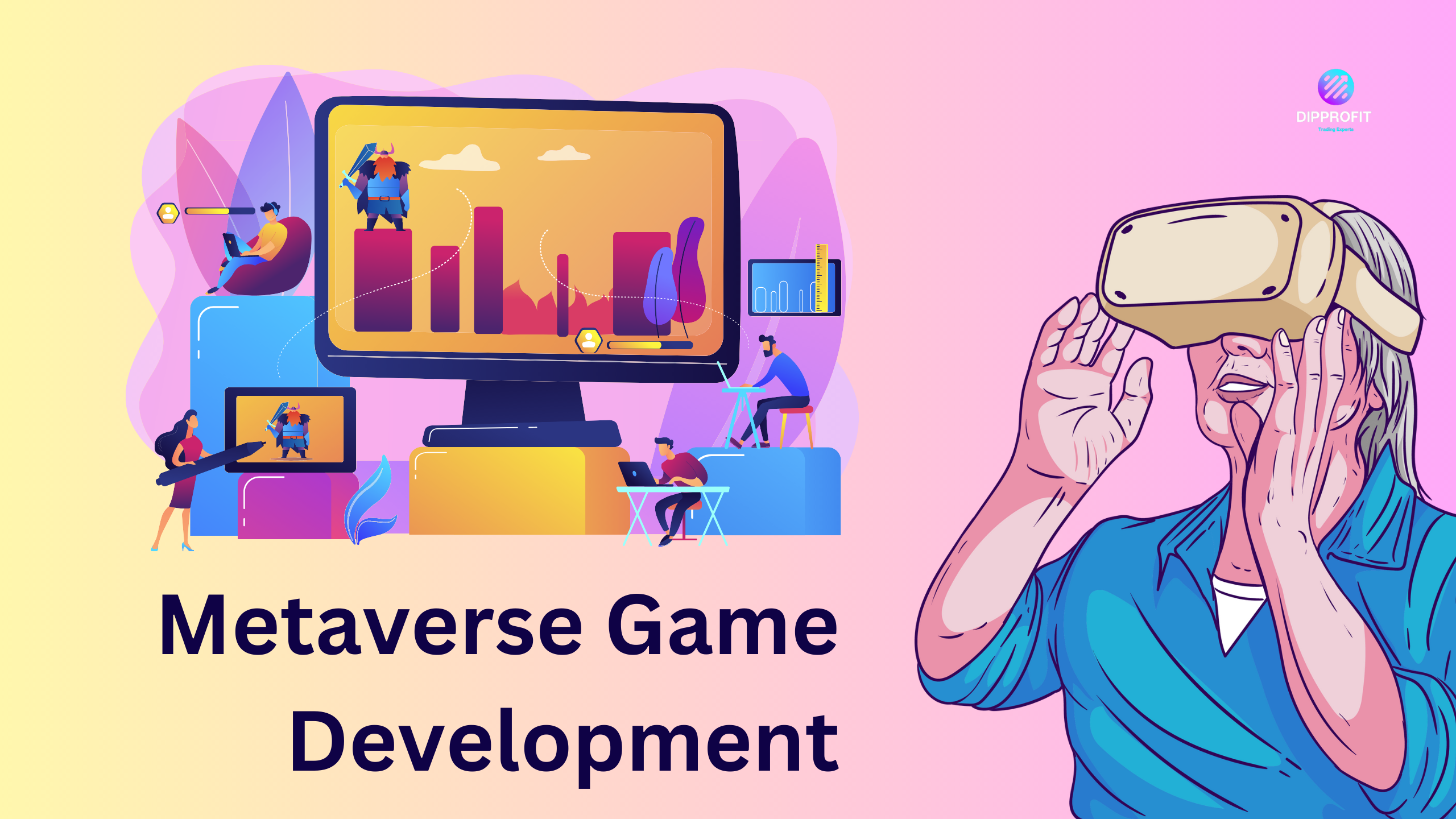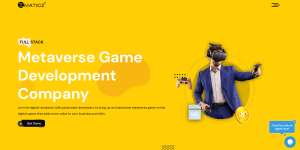

Metaverse game development involves creating and designing virtual worlds that users can enter and interact with in real-time.
These virtual worlds can be accessed through a variety of platforms such as smartphones, tablets, and VR headsets.
Metaverse games typically include elements like social interactions, exploration, customization, and quests.
They also incorporate features that allow users to create and share their own content within the virtual world, such as custom avatars or virtual items.
Developers use a range of tools and technologies to create metaverse games, including 3D modeling software, game engines, and programming languages.
The development process involves designing the virtual world and all its elements, scripting interactions and events, and testing and optimizing performance.
There are already a number of popular metaverse games on the market, such as Second Life, Roblox, and Minecraft.

As technology advances and more people become interested in virtual experiences, it’s likely we’ll see even more metaverse games emerge in the future.
See also: How to Become a Web3 Developer: A Comprehensive Guide
Metaverse Games and Virtual Games
First off, metaverse games and virtual games are two different types of online games.
A Metaverse Game is a virtual world that is created by multiple users where they can interact with each other and the environment.
It is a social platform that allows users to create their own avatars and explore the virtual world, participate in events, and interact with other players. Some examples are Second Life, IMVU, and World of Warcraft.
On the other hand, Virtual Games are computer-based games that simulate real-world scenarios or activities.
These can be single-player or multiplayer games and may or may not have an online component. Examples of virtual games include The Sims, Farmville, and Minecraft.
Why are Brands moving to the Metaverse?
Major companies and clothing brands are now using different metaverse platforms because it offers a new and exciting way to engage with their customers, create immersive experiences, and increase revenue on investment.
For example, a fashion brand could use a metaverse like Decentraland to create virtual runway shows, where customers can attend and interact with the products in a 3D environment.
This could be especially appealing to customers who are unable to attend physical events or who are looking for a more interactive and engaging experience than traditional e-commerce sites can provide.
Nike is an illustration of a well-known company that has migrated to the metaverse.

In the video game “Roblox,” Nike opened a virtual store called “Nike Unite” in December 2020.
Players can use Roblox’s virtual cash to buy limited edition digital and physical goods from the virtual store, including branded sweatshirts and digital sneakers.
Steps to Metaverse Game development
Developing a metaverse game can be an exciting and challenging endeavor that requires careful planning and execution.
As a seasoned game developer or a newcomer to the industry, there are several key steps you’ll need to take to bring your metaverse game to life.
Here are the steps involved:
- Forming a Concept: This is the initial stage where you come up with an idea for your metaverse game. You need to define your game’s theme, concept, and story.
-
Market research: This step involves researching similar games to your concept to understand the market, the audience, and their preferences.
-
Game Design: Once you’ve completed your research and planned the game’s initial concept, you should develop the game design. This process is mainly about creating a blueprint of the game’s elements, such as the environment, characters, storyline, gameplay mechanics, and user interface.
-
Prototype: After preparing the game design, you can create a first or preliminary version of the metaverse game to see how it will function and explore user feedback to improve on the cutbacks.
-
Development: The development phase involves coding, designing game assets, and integrating the game with different technologies like augmented and virtual reality.
-
Testing: After the game is developed, it needs to be tested to identify any errors, bugs, or glitches. This stage ensures the game’s smooth operations and compatibility across various platforms and devices.
-
Launch: The final stage of metaverse game development is launching the game. This involves marketing the game through social media, online advertisements, and word of mouth to create hype and gain user attraction.
These steps may differ depending on the project and the team’s structure, but they give an overview of how to the creation of a game on the metaverse goes
See also: Must-Have Metaverse Devices/Gears To Enter the Metaverse
Agencies that are helping with Metaverse Game Development
Antier Solutions:
Antier Solutions is a software development company that specializes in blockchain-based solutions, including metaverse game development. The company was founded in 2010 and is headquartered in Punjab, India.
Antier Solutions offers a range of services for metaverse game development, including game design, smart contract development, and non-fungible token (NFT) development.
They have experience developing games on various platforms, including, Cardano, Ethereum, Tron, and Polygon.

Unity Technologies

Unity is a very popular game engine that is widely used in metaverse game development.
They offer a range of tools and services for game developers, including 3D modeling and animation, physics simulation, and cross-platform development.
VironIT

VironIT is a software development company that specializes in game development, including metaverse games. They offer services such as game design, programming, and testing.
Mythical Games

Mythical Games is another gaming development studio focused on blockchain-based games and virtual worlds.
Their services include game design, metaverse game development, and blockchain integration.
They have also developed their own platform called “Blankos Block Party,” which is a multiplayer party game.
Maticz
Maticz is a game development agency that specializes in building metaverse games. Their services include custom blockchain development, play-to-earn development, NFT development, and avatar development

See also: Fastest method to turn NFT into Avatars in the Metaverse
Problems associated with Metaverse game development

One of the biggest challenges faced by developers is creating a truly immersive and engaging game world that can keep players engaged for long periods.
This requires a lot of creativity and careful attention to detail when designing game mechanics, characters, and environments.
See also: The 7 Best Metaverse Development Tools in 2023
- Technical Challenges: Developing a metaverse game requires a great understanding of technologies like virtual reality, augmented reality, artificial intelligence, blockchain, and more. Assembling all of these technologies into one can be challenging and time-consuming.
- Design Challenges: The metaverse game designers need to create a new and unique world that is fun, engaging, and immersive. This process requires significant creativity, imagination, and hard work to create a world that is both visually appealing and exciting to explore.
- User Adoption: The success of a metaverse game depends on how many users are playing it, so developers need to design a game that is easy to use and accessible across multiple platforms like VR, PC, and simulators. Ensuring the game’s compatibility with various devices and user-friendly interfaces is a challenge.
- Monetization: Developers need to find a balance between providing a great gaming experience and monetizing the game. Of course, they need to find ways to generate revenue from the game, such as through in-game purchases like upgrades or advertisements, without disrupting the gaming experience.
- Content Creation: Metaverse games require a vast amount of content to keep players engaged, from characters to environments to quests, and more. The agency or team involved must create new content frequently to keep players interested and engaged. Content creation is one aspect that can be outsourced to experts in social media management.
- Security: As with any online environment, metaverse games are vulnerable to hackers, scammers, and malicious actors. Developers must implement high levels of security to protect players’ personal information and prevent fraudulent transactions.
- Community Management: Building and managing a community of players is essential to the success of a metaverse game. The agency involved needs to provide players with an engaging experience while maintaining a safe and welcoming environment for all players. This is done through the use of social media communities on forums on Discord or Reddit, Here, the players and stakeholders are given updates on incomings and other relevant information is passed.
Conclusion
In conclusion, metaverse game development is a fast-growing and exciting field that offers a lot of potential for innovation and creativity.
With blockchain technology, virtual and decentralized worlds are becoming more and more prevalent, and game developers have an opportunity to create immersive and engaging experiences that push the boundaries of what’s possible.